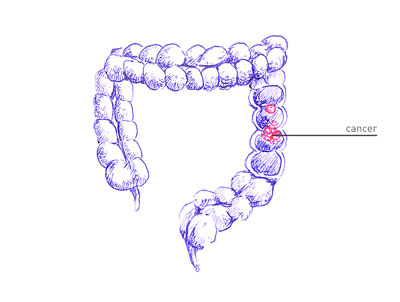The Reality of Colorectal Cancer
It is a type of cancer that forms in the colon or the rectum. As both have many features in common, they are often grouped together as colorectal cancer.

REALITY CHECK
This is the second most common type of cancer in the country. In Malaysia, it has been reported that close to 3,000 people are affected each year and the chances of its risk increase with age.
ABOUT THE COLON AND RECTUM
The colon is also called the large intestine. It is also an organ that is part of the digestive system. Its walls are lined with muscles that squeeze its contents along, removing water, salt, and some nutrients and waste that form the stool. The rectum is the final part of the large intestine that ends in the anus.
Common Types of Colorectal Cancer
COLORECTAL ADENOCARCINOMA
It is a cancer that grows in epithelial cells that line the colon or rectum, which make up the large intestine. It usually begins in the inner lining and eventually spread to other layers. Adenocarcinoma covers 95% of colorectal cancer cases.
GASTROINTESTIAL CARCINOID TUMOUR
Carcinoid tumour cells are slow-growing cancer that develop in neuroendocrine tumours [NETs]. They account for 1% of all colorectal cancers.
METASTATIC COLORECTAL CANCER
Cancer cells sometimes spread from a tumour in the colon or rectum to other parts of the body. These cells travel through the bloodstream or lymphatic system and settle to form new organs. Although the tumour may develop at a new organ, it is still named after its origin, thus the term metastatic colorectal cancer.
Staging and Grading
Once you have been diagnosed positive for cancer after a biopsy test, the condition will be given a stage and grade. This vital information will help you and your healthcare team to choose the best treatment for you. The cancer stage will describe the size of the tumour and how far it has spread.
There are 5 stages for colorectal cancer:
Stage 1
- At this stage, it is known as carcinoma in situ or intramucosal carcinoma. It is the earliest stage of colorectal cancer
- In stage 1, the cancer has not grown beyond the inner layer of the colon or rectum
Stage 2
- The cancer has grown past the muscular mucosa and into the submucosa. There is a chance of it already growing into the muscularis propria as well
- The cancer has not spread to nearby lymph nodes or further areas
Stage 3
- The cancer has grown through most of the layers of the colon or rectum, and may have grown into nearby organs or tissues
- The cancer has not spread to the lymph nodes or distant organs
Stage 4
- The cancers have spread to nearby lymph nodes, but they have not yet spread to other parts of the body
Stage 5
- The cancers have spread to distant organs and tissues
- Most of the time it spreads to the liver, but it can also spread to other organs such as the lungs, brain, peritoneum (the lining of the abdominal cavity), or to further lymph nodes
There are 4 grades of colorectal cancer:
- Grade 1 – The cancer looks much like the normal colorectal tissue
- Grade 2 and 3 – The cancer looks somewhere in between normal and abnormal
- Grade 4 – The cancer appears very abnormal
WARNING SIGNS
Signs and symptoms:
- An on-going chance in bowel movement, such as diarrhoea, constipation, or narrowing of the stool.
- A feeling that the bowel movement was not relieved completely
- Rectal bleeding
- Blood in the stool, either bright red or very dark
- Frequent abdominal cramps, gas pains and bloating
- Weakness and fatigue
- Unknown reason for sudden loss of weight
AM I AT RISK?
Yes, if you fit the following:
- Overweight and not physically active
- Adopting the wrong diet
- Smoking
- Heavy alcohol user
THERE ARE RISK FACTORS THAT CAN'T BE CHANGED:
- Being older
- A personal history of colorectal polyps or colorectal cancer
- A family history of inflammatory bowel disease
- A family history of colorectal cancer or adenomatous polyps
- Inherited syndrome
- Racial and ethnic background
- Having Type 2 diabetes
WHAT CAN I DO?
Beat the cancer. Cut your risk by taking these steps:
- Maintain a balanced body weight
- Practising a healthy diet
- Increase physical activity
- Do not smoke
I have a higher risk of getting colorectal cancer. Can it still be prevented?
Take preventive measures to further lower the risk:
- Genetic testing should be done early if you have a family history of colorectal polyps or cancer.
Colorectal Cancer Myths Vs Facts
Myth |
Fact |
| You don’t need to be screened for colorectal cancer if you have regular bowel movements and are feeling fine. | Colorectal cancer is a serial killer, as the symptoms may only be obvious during the advanced stage of the cancer where chances for cure are much lower. |
| You don’t need to get screened for colorectal cancer if there is no family history of colorectal cancer. | Only 10 to 20 percent of those diagnosed with colorectal cancer has a family history with colorectal cancer. It is possible to get colorectal cancer even if there is no relative who ever had it. |
| Once you are diagnosed with colorectal cancer, there’s no way to cure it. | Colorectal cancer is preventable and treatment is possible if there is early detection. Those who are diagnosed at an early stage have over 90 percent chance of curing and surviving this cancer. |






